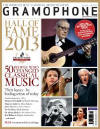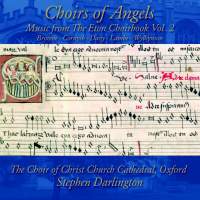Texte paru dans: / Appeared in:
*

GRAMOPHONE (06/2013)
Pour s'abonner /
Subscription information

Reviewer: Caroline Gill
Second Eton Choirbook disc from Christ Church, Oxford
It may have been preferable to widen the net for the second volume of music from the Eton Choirbook (all but one composer on each disc appears on both): the composers represented on both these discs not only enjoy the most exposure in the Choirbook itself but come from its mid- to later period, from which point English polyphony was making dramatic changes. As this disc is so glorious in its sound and effects, it simply seems a shame not to have given a more comprehensive overview of how music developed over the course of the collection’s evolution. Hopefully that means there will be future volumes.
The back
rows are ever so slightly bumped, but largely with ex-Christ Church choral
scholars and lay clerks, so the distinctive Christ Church sound is not lost —
and distinctive it most certainly is. The boys, in particular, sound as they
always have under Stephen Darlington, singing with confident, healthily open
voices that allow them to ascend trough phrases and create a gloriously soaring
effect, especially in the magnificent acoustics of Merton College chapel, away
from the curiously dry acoustics of Christ Church Cathedral. They also manage
with admirable maturity the complicated rhythmic decorations and frequent
harmonic voltes-faces, a focus without which this music can become relentlessly
rudderless, especially in works by Browne and Cornysh. But it is the mighty
nine-part Salve regina by Robert Wylkynson that stands out on this disc:
if ever there is a criticism to be laid at the gates of Christ Church, it is
that the tuning of the top line will occasionally dip when the boys are singing
trough a long phrase, or lose support at the end of one. Although there are rare
visions of this on ‘Choirs of Angels’, none appears in the ‘Wylkynson — instead,
it is a great wall of early Renaissance sound right from the first statement of
the ‘Salve regina’, which is so tenacious in its focus from beginning to end
that it imparts a sense of power that one could only reasonably expect from
adults.
Fermer la fenêtre/Close window
Cliquez l'un ou l'autre
bouton pour découvrir bien d'autres critiques de CD
Click either button for many other reviews


